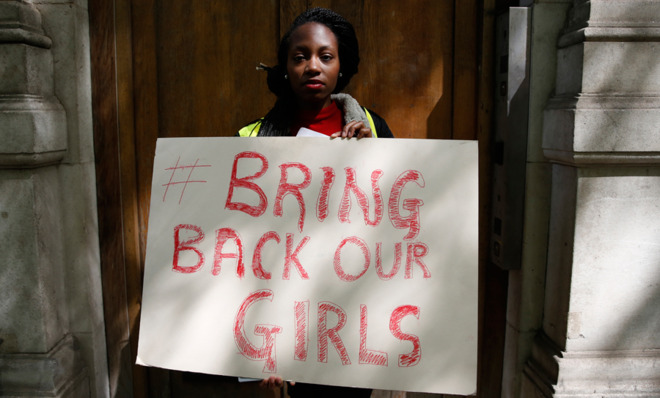This is what could get the U.S. military involved in Nigeria
The U.S. has labeled the African country's oil a "strategic national interest"

A free daily email with the biggest news stories of the day – and the best features from TheWeek.com
You are now subscribed
Your newsletter sign-up was successful

The kidnapping crisis in Nigeria continues after Boko Haram offered earlier this week to exchange the girls for prisoners from the group.
"All I am saying is that if you want us to release the girls that we have kidnapped, those who have not accepted Islam will be treated as the Prophet (Mohammed) treated infidels and they will stay with us," Boko Haram leader Abubakar Shekau said in a video posted to You Tube. "We will not release them while you detain our brothers."
The offer comes as military advisers from the United States, France and other countries arrive to assist the Nigeria military in its inept search for the 276 school girls kidnapped three weeks ago. But other than advising and providing intelligence, foreign militaries are unlikely to get involved.
The Week
Escape your echo chamber. Get the facts behind the news, plus analysis from multiple perspectives.

Sign up for The Week's Free Newsletters
From our morning news briefing to a weekly Good News Newsletter, get the best of The Week delivered directly to your inbox.
From our morning news briefing to a weekly Good News Newsletter, get the best of The Week delivered directly to your inbox.
However, there's one scenario that could change that.
Nigeria's energy sector would be disrupted if the conflict between Boko Haram and the Nigerian government grows wider and stretches into the country's south, where oil is located. Nigeria exports oil known as bonny light, a sweet crude that can easily be refined into gasoline, all over the world; it's the sixth largest exporter of oil to the United States.
That means that a small disruption of supply from Nigeria would be felt at the gas pump. The country's oil is so important that in 2002, President Bush declared it a "strategic national interest," meaning the United States could send its military to protect it.
Path to civil war
A free daily email with the biggest news stories of the day – and the best features from TheWeek.com
Any incursion by the group into the country's south could also trigger a civil war, which would decimate Nigeria's energy sector. There is an active, capable militancy movement in the Niger Delta where companies like Shell remove billions of dollars in oil each year while the vast majority of Nigerians live in poverty. I met with members of this militancy during a trip to Port Harcourt in 2011, and they were itching for a fight with Boko Haram (my original report on Delta militancy can be found here).
These militants are fierce. In 2007, they chased the Nigerian military out of the Delta. In an effort to get them to stop stealing oil and kidnapping foreign workers, Nigeria President Goodluck Jonathan offered them an amnesty payment in 2009. Some older leaders accepted it, but younger, more radical leaders simply took their place.
"Boko Haram should not come here," one of the leaders of the Movement for the Emancipation of the Niger Delta (MEND) told me when I asked about the group.
Blessings Dumo, who was a member of the Niger Delta People's Volunteer Force, was more animated in his criticism of Boko Haram. He said the group was looking for an amnesty payment.
"The answer is Western education," he said, referring to Boko Haram's name, which roughly translates to "Western education is a sin." "To hell with Boko Haram."
One leader I met was itching for a fight with the group. General JB commands the Icelanders, a group that controls many of the Port Harcourt's waterways.
"The problem of Boko Haram is not a problem," JB told me. "We'll tell the nation to observe and declare a 48-hour war between Boko Haram and the Niger Delta youth."
"Let them see what happens. If it comes to that, we will be very much grateful," he added. "We must shame them to the general public. Boko Haram has nothing to be proud of."
More from The Fiscal Times...
-
 Political cartoons for February 12
Political cartoons for February 12Cartoons Thursday's political cartoons include a Pam Bondi performance, Ghislaine Maxwell on tour, and ICE detention facilities
-
 Arcadia: Tom Stoppard’s ‘masterpiece’ makes a ‘triumphant’ return
Arcadia: Tom Stoppard’s ‘masterpiece’ makes a ‘triumphant’ returnThe Week Recommends Carrie Cracknell’s revival at the Old Vic ‘grips like a thriller’
-
 My Father’s Shadow: a ‘magically nimble’ film
My Father’s Shadow: a ‘magically nimble’ filmThe Week Recommends Akinola Davies Jr’s touching and ‘tender’ tale of two brothers in 1990s Nigeria